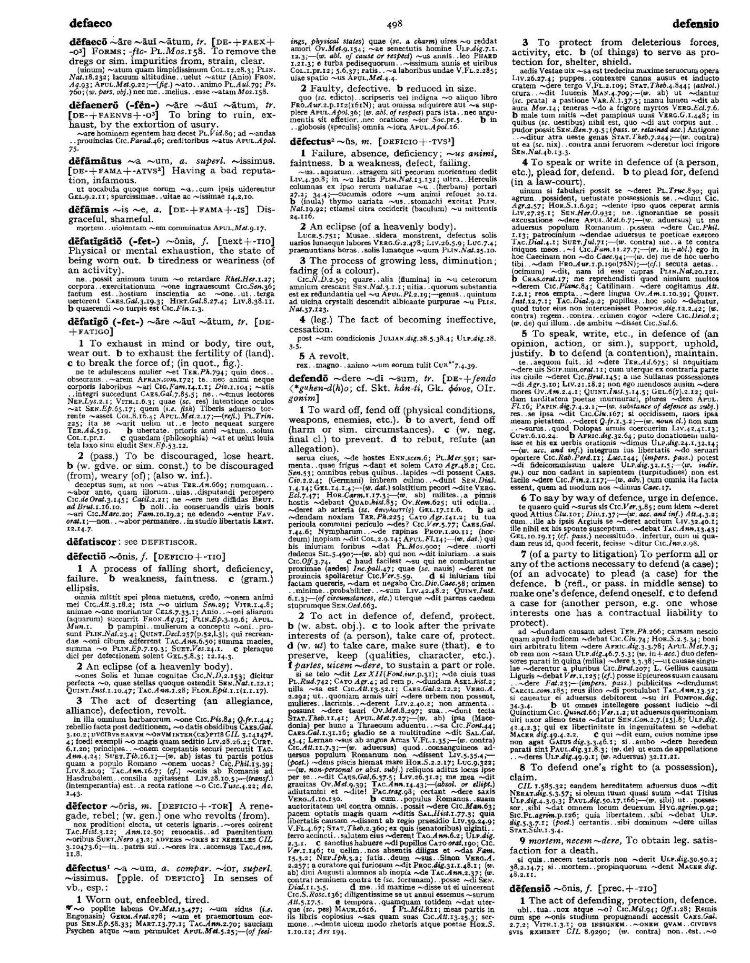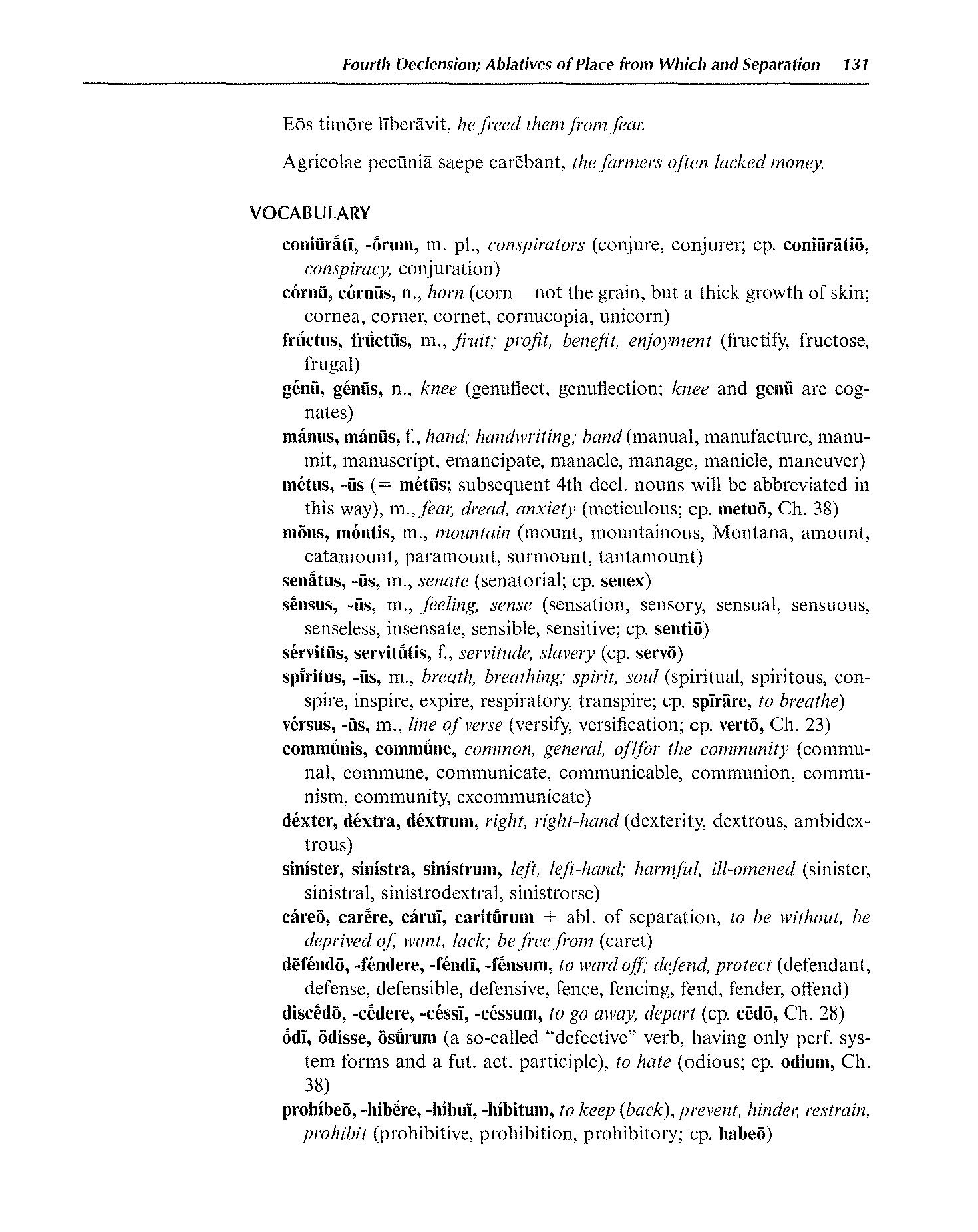
page_listing.tpl
page_subListingDetails.tpl
sub_listingDetails_style1.tpl
sub_listingDetails.title.tpl
dēfendere to defend
dēfendere is a Latin Verb that primarily means to defend.
Definitions for dēfendere
Wheelock's Latin
Verb
- 1
to ward off, defend, protect
English derivatives:
defendant defense defensible defensive fence fencing fend fender offend
Oxford Latin Dictionary
Verb
- 1
To ward off, fend off (physical conditions, weapons, enemies, etc.). (b) to avert, fend off (harm or sim. circumstances). (c) (w. neg. final cl.) to prevent. (d) to rebut, refute (an allegation).
- 2
To act in defence of, defend, protect. (b)(w. abst. obj.). (c) to look after the private interests of (a person), take care of, protect. (d) (w. ut) to take care, make sure (that). (e) to preserve, keep (qualities, character, etc.).
- 3
To protect from deleterious forces, activity, etc. (b) (of things) to serve as protection for, shelter, shield.
- 4
To speak or write in defence of (a person, etc.), plead for, defend. (b) to plead for, defend (in a law-court).
- 5
To speak, write, etc., in defence of (an opinion, action, or sim.), support, uphold, justify. (b) to defend (a contention), maintain.
Sentences with dēfendere
Latin to English
At nemō erat quī istum hominem turpem dēfenderet.Compare But there was no one who would defend that base fellow.
Amīcus meus quī cōnsulem dēfendit ipse erat vir clārissimus.Compare My friend who defended the consul was himself a very famous man.
Tanto est accusare quam defendere, quanto facere quam sanare vulnera, facilius.Compare It is just so much easier to accuse than to defend as it is easier to inflict than to heal a wound.
Absentem qui rodit amicum, qui non defendit alio culpante, solutos qui captat risus hominum famamque dicacis, fingere qui non visa potest, commissa facere qui nequit: hic niger est, hunc tu, Romane, caveto.Compare The man who backbites an absent friend, nay, who does not stand up for him when another blames him, the man who angles for bursts of laughter and for the repute of a wit, who can invent what he never saw, who cannot keep a secret - that man is black at heart: mark and avoid him, if you are a Roman.
Defendo multus mortalis, multus civitas, Sicilia totus.Compare I defend many men, many states, all Sicily.
Defendo urbs possum spes nullus sum.Compare There was no hope that the city could be defended.
Equidem non desino tuus decretum defendo.Compare I for my part will not cease to defend your decrees.
Conjugation table for dēfendere
Cactus2000
| ACTIVE | |
| Indicative present | Indicative imperfect |
| dēfendō dēfendis dēfendit dēfendimus dēfenditis dēfendunt | dēfendēbam dēfendēbās dēfendēbat dēfendēbāmus dēfendēbātis dēfendēbant |
| Indicative perfect | Indicative pluperfect |
| dēfendī dēfendistī dēfendit dēfendimus dēfendistis dēfendērunt / dēfendēre | dēfenderam dēfenderās dēfenderat dēfenderāmus dēfenderātis dēfenderant |
| Indicative future | Indicative future perfect |
| dēfendam dēfendēs dēfendet dēfendēmus dēfendētis dēfendent | dēfenderō dēfenderis dēfenderit dēfenderimus dēfenderitis dēfenderint |
| Subjunctive present | Subjunctive imperfect |
| dēfendam dēfendās dēfendat dēfendāmus dēfendātis dēfendant | dēfenderem dēfenderēs dēfenderet dēfenderēmus dēfenderētis dēfenderent |
| Subjunctive perfect | Subjunctive pluperfect |
| dēfenderim dēfenderis dēfenderit dēfenderimus dēfenderitis dēfenderint | dēfendissem dēfendissēs dēfendisset dēfendissēmus dēfendissētis dēfendissent |
Infinitive present dēfendere Infinitive perfect dēfendisse Infinitive future dēfēnsūrum esse | Imperative present dēfende dēfendite Imperative future dēfenditō dēfenditō dēfenditōte dēfenduntō |
| PASSIVE | |
| Indicative present | Indicative imperfect |
| dēfendor dēfenderis dēfenditur dēfendimur dēfendiminī dēfenduntur | dēfendēbar dēfendēbāris / dēfendēbāre dēfendēbātur dēfendēbāmur dēfendēbāminī dēfendēbantur |
| Indicative perfect | Indicative pluperfect |
| dēfēnsus sum dēfēnsus es dēfēnsus est dēfēnsī sumus dēfēnsī estis dēfēnsī sunt | dēfēnsus eram dēfēnsus erās dēfēnsus erat dēfēnsī erāmus dēfēnsī erātis dēfēnsī erant |
| Indicative future | Indicative future perfect |
| dēfendar dēfendēris / dēfendēre dēfendētur dēfendēmur dēfendēminī dēfendentur | dēfēnsus erō dēfēnsus eris dēfēnsus erit dēfēnsī erimus dēfēnsī eritis dēfēnsī erunt |
| Subjunctive present | Subjunctive imperfect |
| dēfendar dēfendāris / dēfendāre dēfendātur dēfendāmur dēfendāminī dēfendantur | dēfenderer dēfenderēris / dēfenderēre dēfenderētur dēfenderēmur dēfenderēminī dēfenderentur |
| Subjunctive perfect | Subjunctive pluperfect |
| dēfēnsus sim dēfēnsus sīs dēfēnsus sit dēfēnsī sīmus dēfēnsī sītis dēfēnsī sint | dēfēnsus essem dēfēnsus essēs dēfēnsus esset dēfēnsī essēmus dēfēnsī essētis dēfēnsī essent |
Infinitive present dēfendī Infinitive perfect dēfēnsum esse Infinitive future dēfēnsum īrī | Imperative present dēfendere dēfendiminī Imperative future dēfenditor dēfenditor - dēfenduntor |
| PARTICIPLE | ||
| Participle present active | ||
| Nom. | dēfendēns | dēfendentēs |
| Gen. | dēfendentis | dēfendentium |
| Dat. | dēfendentī | dēfendentibus |
| Acc. | dēfendentem | dēfendentēs |
| Abl. | dēfendente | dēfendentibus |
| Participle future active | ||
| Nom. | dēfēnsūrus | dēfēnsūrī |
| Gen. | dēfēnsūrī | dēfēnsūrōrum |
| Dat. | dēfēnsūrō | dēfēnsūrīs |
| Acc. | dēfēnsūrum | dēfēnsūrōs |
| Abl. | dēfēnsūrō | dēfēnsūrīs |
| Participle perfect passive | ||
| Nom. | dēfēnsus | dēfēnsī |
| Gen. | dēfēnsī | dēfēnsōrum |
| Dat. | dēfēnsō | dēfēnsīs |
| Acc. | dēfēnsum | dēfēnsōs |
| Abl. | dēfēnsō | dēfēnsīs |
| Gerundive | ||
| Nom. | dēfendendus | dēfendendī |
| Gen. | dēfendendī | dēfendendōrum |
| Dat. | dēfendendō | dēfendendīs |
| Acc. | dēfendendum | dēfendendōs |
| Abl. | dēfendendō | dēfendendīs |
| Gerund | Supine | |
| Nom. | dēfendere | dēfēnsum |
| Gen. | dēfendendī | dēfēnsū |
| Dat. | dēfendendō | |
| Acc. | dēfendendum | |
| Abl. | dēfendendō | |
Data sources
Notes
- Definitions
- Frederick M. Wheelock, Wheelock's Latin, 6th ed., rev. Richard A. LaFleur (New York, NY: HarperCollins Publishers, 2005): 131.
- P. G. W. Glare, Oxford Latin Dictionary, Vols. 1-8 (Oxford: Clarendon Press, 1982): 498.
- Word frequencies
- Christopher Francese, "Latin Core Vocabulary," Dickinson College Commentaries, last modified 2014, http://dcc.dickinson.edu.
- Paul B. Diederich, The Frequency of Latin Words and Their Endings, PhD diss., (Columbia University, 1939).
- Louis Delatte, Suzanne Govaerts, Joseph Denooz, and Etienne Evrard, Dictionnaire fréquentiel et index inverse de la langue latine [Frequency Dictionary and Inverse Index of the Latin Language] (Liège, Belgium: Laboratoire d'analyse statistique des langues anciennes de l'Université de Liège [L.A.S.L.A.], 1981): 123.
Bibliography
Allen, Joseph H. Allen and Greenough's New Latin Grammar for Schools and Colleges: Founded on Comparative Grammar. Edited by James B. Greenough, George L. Kittredge, Albert A. Howard, and Benjamin L. D'Ooge. Boston, MA: Ginn & Company, 1903.
Crystal, David. A Dictionary of Linguistics and Phonetics. 6th ed. Oxford, UK: Blackwell Publishing, 2008.
Delatte, Louis, Suzanne Govaerts, Joseph Denooz, and Etienne Evrard. Dictionnaire fréquentiel et index inverse de la langue latine [Frequency Dictionary and Inverse Index of the Latin Language]. Liège, Belgium: Laboratoire d'analyse statistique des langues anciennes de l'Université de Liège (L.A.S.L.A.), 1981.
Diederich, Paul B. The Frequency of Latin Words and Their Endings. PhD diss., Columbia University, 1939.
Francese, Christopher. "Latin Core Vocabulary." Dickinson College Commentaries. Last modified 2014. http://dcc.dickinson.edu/latin-vocabulary-list.
Gildersleeve, Basil L., and Gonzales Lodge. Gildersleeve's Latin Grammar: Third Edition, Revised, and Enlarged. 3rd ed. London, England: Macmillan and Co., 1903.
Glare, Peter G.W. Oxford Latin Dictionary. Vols. 1-8. Oxford, England: Clarendon Press, 1982.
Krüger, Bernd. "Latin Conjugation Tables." Cactus2000. Accessed May 5, 2023. https://latin.cactus2000.de/index.en.php.
Pierson, Nick. "Sound of Text." Accessed October 26, 2019. https://soundoftext.com.
Wheelock, Frederick M. Wheelock's Latin. 6th ed. Revised by Richard A. LaFleur. New York, NY: HarperCollins Publishers, 2005.
Wiktionary Contributors. "Victionarium." Wikimedia Foundation, Inc. Updated March 18, 2019. https://la.wiktionary.org/wiki/Victionarium:Pagina_prima.
Citation
Chicago (17th ed.)
Allo Contributors. "dēfendō, dēfendere, dēfendī, dēfēnsum (v.) - Latin Word Definition." Allo Latin Dictionary. Last modified . Accessed February 20, 2026. http://ancientlanguages.org/latin/dictionary/defendo-defendere-defendi-defensum.
Entry created on . Last updated on .







